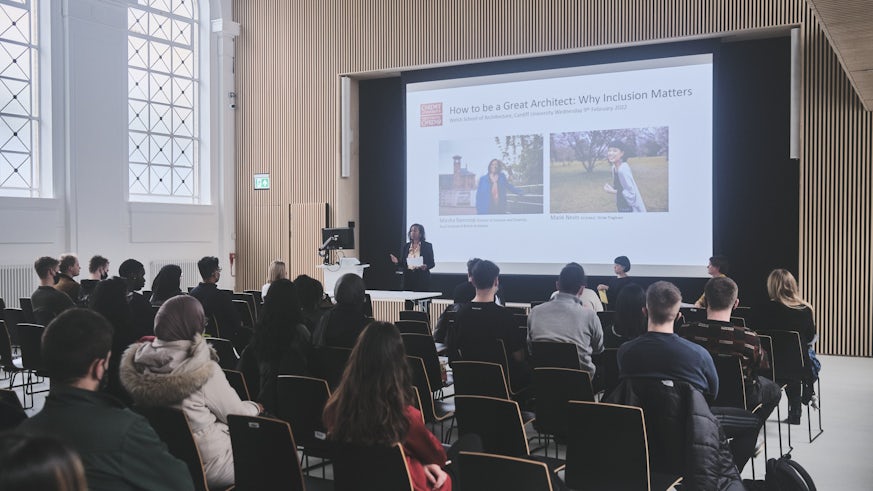How to be a Great Architect: Why Inclusivity Matters – a conversation with Marsha Ramroop and Marié Nevin
21 March 2022

Professor Mhairi McVicar, Director of Equality, Diversity and Inclusion at the Welsh School of Architecture (WSA) chaired a conversation on How to be a Great Architect: Why Inclusivity Matters with Marsha Ramroop, Director of Inclusion and Diversity at the Royal Institute of British Architects and Marié Nevin, Architect at Stride Treglown and WSA graduate.
The conversation was held in the recently refurbished Exhibition Space in the Welsh School of Architecture and began with Marsha and Marié each presenting a provocation, followed by a conversation on ways to bring about inclusive change in architecture, Cultural Intelligence (CQ), and the role of engagement and mentoring.
Mhairi began the session by noting that “our work as architects can never be neutral…in learning, teaching, researching and engaging with architecture we can understand inclusion as impacting everything that we do.”
Marsha set a provocation for the audience, the WSA, and the architectural profession to reflect on from a community wide scale – questioning why we need to think about inclusion and diversity in architecture. “Architecture can never be great if we don’t consider inclusivity”, Marsha began, questioning, “are we involving the voices of all communities, and not just the loudest voices’?” Marsha reminded us that “there are people who can bring greatness to this profession, and we’re not letting them in … EDI is important because those who do get in aren’t always supported and given a strong enough voice.” The challenge was set to every single one of us to tackle the issues we face in EDI and architectural education. “The culture of any organisation,” Marsha observed, “is shaped by the worst behaviour the leader is willing to tolerate’ and, conversely, “the culture of any organisation can be shaped by the best behaviours our leaders are willing to demonstrate.” The audience were challenged to consider what is stopping each of us in using our existing knowledge, skills, and abilities to be inclusive in driving forward change in architecture.
Marié set a provocation within the context of professional architectural practice, stating that “we have a responsibility to make a positive impact on society by shaping spaces around people – understanding what it means to design inclusively is key. So what is inclusive design?” Marié suggested people are at the heart of inclusive design, if “we are to create spaces which are safe and accessible to everyone” and emphasised the need to consider barriers at each stage of the design process which could make certain groups feel uncomfortable or excluded, addressing these by opening up dialogues with communities and users, and approaching dialogue with an open mind and welcoming feedback. Marié discussed two case studies – the Deaf Academy in Exmouth using sign language translation in consultations throughout the design process, and a Grange Pavilion climate action workshop – reminding the audience that “you don’t need to wait for a community engagement project to come to you, you can always looks for ways you can make a positive impact locally.”
The event closed with a conversation between the two speakers and the audience, discussing the impact and barriers of historical and contemporary cultural practices within architectural education and the profession, including positive approaches to reviews and feedback, challenges of changing infrastructures which foster bias, advocating social value, leaning into discomfort, and accepting the consequences of bias in creating a negative impact, regardless of the intention.
Reflecting on the discussion, Mhairi said:
“It was an honour to welcome Marsha and Marié to the Welsh School of Architecture to discuss long term actions on inclusivity in architecture, and to discuss what is already happening in our School. We would like to thank both of them for coming along today and hope to welcome them again soon to share ongoing guidance and collaboration on this urgent and necessary work.”
The talk was supported by the Talking Anti-Racism series held by Cardiff University, recordings of earlier events can be found on the webpage.